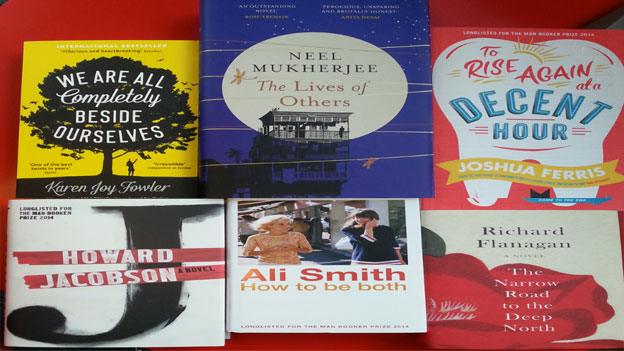Man Booker Prize: Richard Flanagan wins for wartime love story
- Published
Richard Flanagan: ''It was a book I couldn't escape writing''
Australian author Richard Flanagan has won the £50,000 Man Booker Prize for his wartime novel The Narrow Road to the Deep North.
AC Grayling, chair of the judges, said it was a "remarkable love story as well as a story about human suffering and comradeship".
Flanagan's novel is set during the construction of the Thailand-Burma Death Railway in World War Two.
It was announced as the winner on Tuesday at London's Guildhall.
Flanagan, 53, was presented with his prize by The Duchess of Cornwall.
Richard Flanagan: ''I never expected to stand here before you in this grand hall in London as a writer, being so honoured''
"In Australia the Man Booker is sometimes seen as something of a chicken raffle," Flanagan said. "I just didn't expect to end up the chicken."
The book was inspired by the author's father, a Japanese prisoner of war who survived the Death Railway, but died aged 98 on the day the novel was finished.
The railway between Bangkok in Thailand and Rangoon in Burma was built by Japan in 1943 to support its forces, using forced labour. More than 100,000 people died during its construction.
'Truth in detail'
"The battle was to write something that wasn't [my father's] story but, at the same time, true to the fundamental spiritual truth of his experience," Flanagan told the BBC.
"He trusted me, he never asked me what the story was. But I did talk to him often about very small things.
"What the mud was like, what the smell of a rotting tropical ulcer that had eaten through to the shin bone exactly was. What a tiny ball of sour rice would taste like when you're starving, what starvation felt like in your belly and your brain.
"It was those things I talked to him about because I think truth exists in those small but very real physical details."
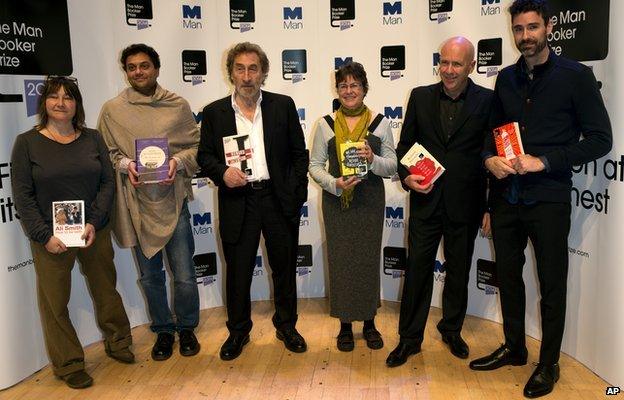
Man Booker shortlisted authors (l-r): Ali Smith, Neel Mukherjee, Howard Jacobson, Karen Joy Fowler, Richard Flanagan and Joshua Ferris
Grayling said the judges reached a majority decision after three hours of debate.
"The two great themes from the origin of literature are love and war: this is a magnificent novel of love and war," he said.
"Written in prose of extraordinary elegance and force, it bridges East and West, past and present, with a story of guilt and heroism."
The Narrow Road to the Deep North is Tasmania-born Flanagan's sixth novel and it took 12 years to complete.
The story is set in a Japanese prisoner of war camp and centres upon the experiences of surgeon Dorrigo Evans, who is haunted by his love affair with his uncle's young wife two years earlier.

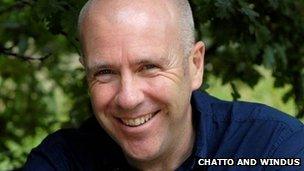
RICHARD FLANAGAN - AT A GLANCE
Born in Tasmania in July 1961.
Flanagan's previous novels - Death of a River Guide, The Sound of One Hand Clapping, Gould's Book of Fish, The Unknown Terrorist and Wanting - have been published in 26 countries.
He directed a feature film version of The Sound Of One Hand Clapping (1998), which starred Kerry Fox.
He also co-wrote the screenplay for Baz Luhrmann's 2008 film Australia, starring Nicole Kidman and Hugh Jackman.
The book is dedicated "to prisoner san byaku san ju go" - a reference to his father's Japanese prison number, 335.

Catherine Taylor, reviewing the book for The Telegraph, external, said: "Flanagan's writing courses like a river, sometimes black with mud, sludge and corpses, sometimes bright with moonlight."
Carl Wilkinson, in the Financial Times, external, called it "elegantly wrought, measured and without an ounce of melodrama".
The Narrow Road to the Deep North had been the bookmakers' second favourite after Neel Mukherjee's The Lives Of Others, a sweeping account of life in 1960s Calcutta.
Also on the shortlist were authors Joshua Ferris, Karen Joy Fowler, Howard Jacobson and Ali Smith.
'Kick in the stomach'
Grayling said: "The best and worst of judging books is when you come across one that kicks you so hard in the stomach like this that you can't pick up the next one in the pile for a couple of days. That's what happened in the case of this book."
This was the first year that the Man Booker Prize had been open to all authors writing in English, regardless of nationality. Some writers had expressed fears that the change in the rules could lead to dominance by US authors.
The shortlist consisted of two American writers, three British and one Australian.
"There is a very powerful cohort of contemporary American writers, but neither the longlist nor the shortlist was overwhelmed by them," said Grayling.
Last year, the Booker was won by New Zealand's Eleanor Catton for The Luminaries. At 28, she was the youngest ever winner.
- Published9 September 2014
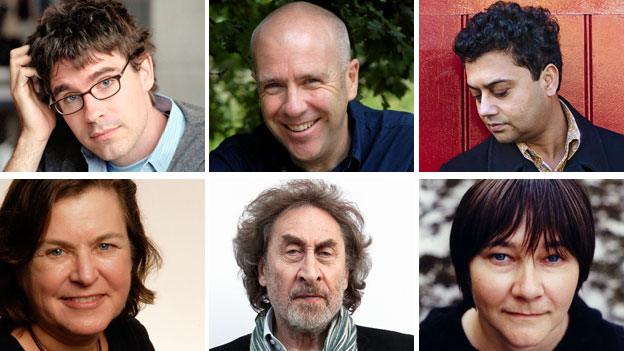
- Published14 October 2014
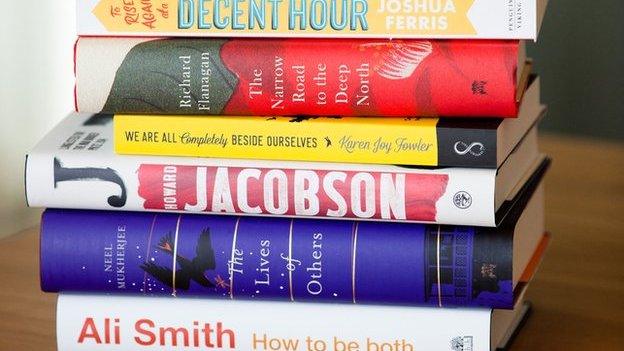
- Published9 September 2014
